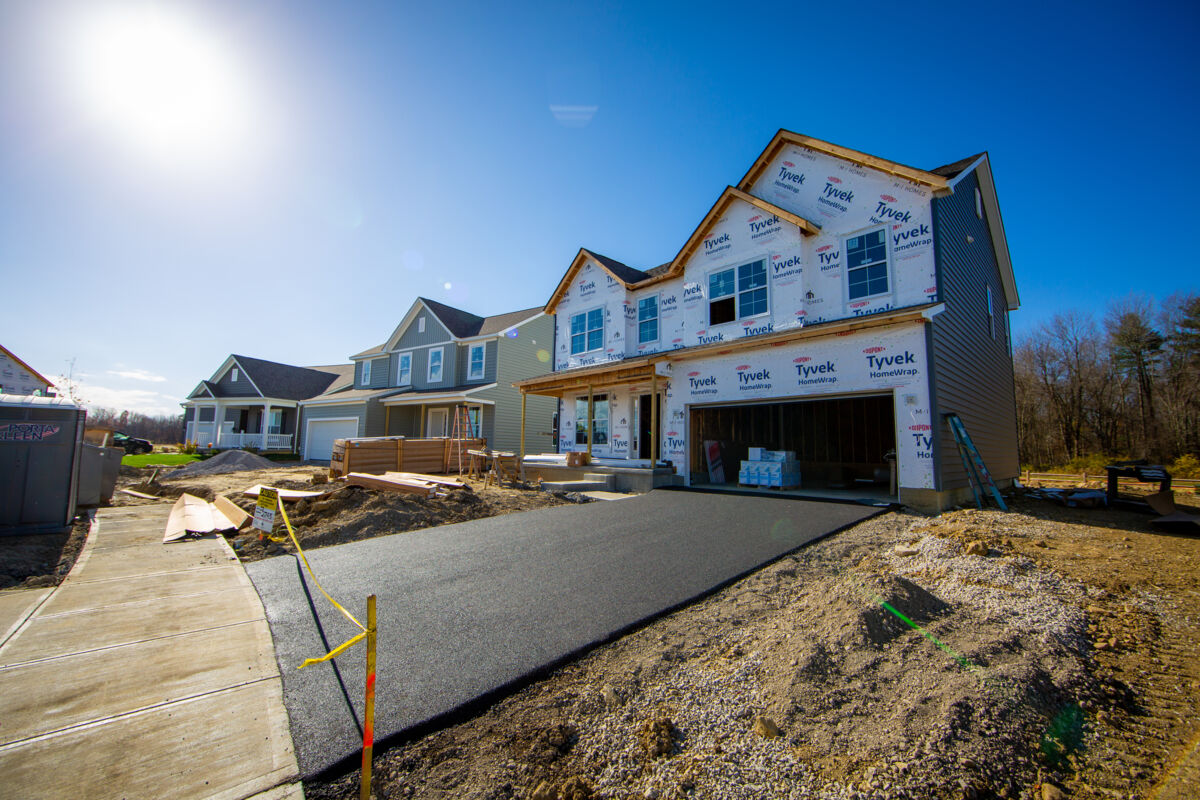Home>diy>Building & Construction>What Is DBE In Construction


Building & Construction
What Is DBE In Construction
Modified: February 23, 2024
Learn about DBE in construction and its importance in building-construction. Find out how it can help small businesses and promote diversity in the industry.
(Many of the links in this article redirect to a specific reviewed product. Your purchase of these products through affiliate links helps to generate commission for Storables.com, at no extra cost. Learn more)
Introduction
In the world of construction, various programs and initiatives exist to promote diversity and inclusion in the industry. One such program is the Disadvantaged Business Enterprise (DBE) program. The DBE program aims to provide equal opportunities for small businesses owned and controlled by socially and economically disadvantaged individuals.
The DBE program was established by the U.S. Department of Transportation (DOT) to ensure that minority-owned and women-owned businesses have fair access to government contracts in the transportation industry. However, the DBE program has also been adopted by many state and local government agencies, as well as private sector entities, to promote diversity and fairness in all aspects of the construction industry.
Under the DBE program, businesses that meet certain criteria can obtain certification as a DBE and receive various benefits, including increased visibility, access to government contracts, and assistance with networking and business development. In addition, project owners and prime contractors who fulfill DBE participation goals can receive incentives and demonstrate their commitment to diversity.
This article will delve into the details of the DBE program in construction, including the definition and benefits of DBE, the requirements for certification, program compliance and enforcement, participation goals and reporting, challenges and criticisms, as well as success stories and case studies showcasing the positive impact of the DBE program.
Whether you are a construction professional, a small business owner, or an advocate for diversity and inclusion, understanding the DBE program is crucial for navigating the ever-evolving landscape of the construction industry and harnessing the benefits of a diverse and inclusive workforce.
Key Takeaways:
- The DBE program in construction provides certified businesses with increased access to government contracts, networking opportunities, and incentives for project owners, fostering a more diverse and inclusive industry.
- While facing challenges, DBE-certified businesses have showcased their expertise and positive impact, highlighting the value of diversity and inclusion in creating economic opportunities and social change in the construction sector.
Read more: What Is Construction
Definition of DBE
The Disadvantaged Business Enterprise (DBE) is a certification program designed to level the playing field for small businesses owned and controlled by socially and economically disadvantaged individuals. The program aims to provide equal opportunities for these businesses to compete for and participate in government contracts in the transportation and construction sectors.
To be eligible for DBE certification, a business must meet specific criteria. First and foremost, the business must be owned and controlled by individuals who are socially and economically disadvantaged. This typically includes individuals who belong to racial or ethnic minority groups, women, individuals with disabilities, or individuals from economically disadvantaged backgrounds.
Ownership and control are critical factors for DBE certification. The socially and economically disadvantaged individuals must have a controlling interest in the business, meaning they have the power to make policy and operational decisions. They must also bear the financial risk and receive the benefits and profits of the business.
In addition to the ownership and control requirements, the business seeking DBE certification must be a small business, as defined by the Small Business Administration (SBA) size standards. These size standards vary depending on the industry and are based on factors such as average annual revenue and the number of employees.
It’s important to note that DBE certification is not limited to construction businesses. While the program originated in the transportation industry, it has expanded to cover various sectors, including construction, engineering, architecture, consulting, and more.
Furthermore, DBE certification is not limited to individual businesses. Joint ventures or partnerships between DBE-certified and non-DBE businesses can also participate in DBE programs, provided that the DBE partner meets the eligibility criteria and has a substantial role in the project.
In summary, the DBE program provides businesses owned and controlled by socially and economically disadvantaged individuals with the opportunity to obtain certification. This certification enables them to compete for and participate in government contracts in the transportation and construction sectors, promoting diversity and inclusion in the industry.
Benefits of DBE in Construction
The Disadvantaged Business Enterprise (DBE) program in construction offers a range of benefits for both DBE-certified businesses and the overall industry. These benefits contribute to promoting diversity, enhancing economic opportunities, and fostering a more inclusive construction sector. Here are some of the key advantages of the DBE program:
1. Increased Access to Government Contracts:
DBE-certified businesses have expanded opportunities to compete for government contracts in the transportation and construction sectors. With DBE status, they gain access to a wide range of projects funded by federal, state, and local agencies. This increased access can significantly boost their revenue and business growth.
2. Networking and Business Development Assistance:
DBE programs often provide resources, training, and networking opportunities to help DBE-certified businesses grow and thrive. These initiatives can include workshops, business development programs, mentoring, and networking events that facilitate connections with prime contractors and industry professionals. Such support helps DBEs build relationships and secure future business opportunities.
Read more: What Is Drainage In Construction
3. Visibility and Marketing Opportunities:
DBE certification brings visibility to businesses within the construction industry. Government agencies and prime contractors seeking to meet DBE participation goals actively seek out DBE-certified businesses for subcontracting opportunities. This increased exposure can lead to new partnerships, contracts, and sustained growth for DBE-certified businesses.
4. Incentives for Project Owners and Prime Contractors:
Government entities often set DBE participation goals for their projects to ensure diversity and inclusion in contracting. Project owners and prime contractors who meet or exceed these goals may receive incentives, such as credits, bonuses, or enhanced evaluation scores in the bidding process. By partnering with DBE-certified businesses, stakeholders can showcase their commitment to diversity and access these benefits.
5. Enhanced Economic Development:
The DBE program plays a crucial role in promoting economic development within disadvantaged communities. By facilitating opportunities for socially and economically disadvantaged individuals, the program helps create jobs, stimulate economic growth, and contribute to the overall well-being of these communities. This not only benefits DBE-certified businesses but also helps bridge economic disparities.
6. Improved Supplier Diversity:
DBE participation in construction projects enhances supplier diversity by increasing the representation of minority-owned and women-owned businesses. This diversification of the supply chain fosters innovation, competition, and equitable distribution of economic benefits. It also promotes a more inclusive and equitable construction industry as a whole.
In summary, the DBE program in construction offers a range of benefits, including increased access to government contracts, networking and business development assistance, enhanced visibility and marketing opportunities, incentives for project owners and prime contractors, enhanced economic development, and improved supplier diversity. These advantages not only support the growth of DBE-certified businesses but also contribute to a more diverse, inclusive, and vibrant construction industry.
Read more: What Is An AHA In Construction
Requirements for DBE Certification
To obtain DBE certification, businesses must meet certain requirements established by the relevant certifying agency. While specific requirements may vary depending on the agency and jurisdiction, here are some common criteria typically considered for DBE certification in the construction industry:
1. Ownership and Control:
The business must be at least 51% owned and controlled by socially and economically disadvantaged individuals. These individuals must have the power to make policy and operational decisions and must bear the financial risk and benefits of the business.
2. Economic Disadvantage:
The socially and economically disadvantaged individuals must meet specific criteria demonstrating their economic disadvantage. This typically includes factors such as personal net worth limitations, income thresholds, and proof of socioeconomic disadvantage based on historical discrimination or social disadvantage.
3. Size Standards:
The business seeking DBE certification must meet the size standards set by the Small Business Administration (SBA). These size standards vary depending on the industry and are based on factors such as average annual revenue and the number of employees.
Read more: What Is A Wattle In Construction
4. Legal Structure:
The business must have a legal structure, such as a sole proprietorship, partnership, corporation, or limited liability company (LLC), that complies with the legal requirements of the jurisdiction in which it operates.
5. Good Character:
The individuals with an ownership stake in the business must demonstrate good character, integrity, and sound business practices. This is usually assessed through background checks, reference checks, and review of legal and financial histories.
6. Expertise and Experience:
The business must possess the expertise and experience necessary to perform in the construction industry. This may include providing evidence of past projects, certifications, licenses, and qualifications that demonstrate the business’s competence in their field.
7. Financial Viability:
The business must demonstrate financial viability and the ability to sustain operations. This may involve submitting financial statements, tax returns, bank statements, and other relevant financial documents as part of the certification process.
Read more: What Is An MEP In Construction
8. Disclosure Requirements:
The business and its owners must disclose any affiliations, prior or current litigation history, and any potential conflicts of interest that may impact their eligibility for DBE certification.
It’s important to note that the DBE certification process can be complex, and requirements may vary depending on the certifying agency and local regulations. It’s advisable for businesses seeking DBE certification to carefully review the specific requirements outlined by the certifying agency and seek assistance from consultants or industry organizations that specialize in DBE certification.
By meeting these requirements and obtaining DBE certification, businesses can gain access to the diverse set of benefits associated with the DBE program and position themselves for increased opportunities in the construction industry.
DBE Program Compliance and Enforcement
Compliance with DBE program requirements is essential to maintain the integrity and effectiveness of the program. Government agencies and prime contractors responsible for executing projects with DBE participation goals have a vested interest in ensuring that the program is implemented and enforced properly. Here are some key aspects of DBE program compliance and enforcement:
1. Certification and Verification:
DBE-certified businesses must adhere to the eligibility requirements established by the certifying agency. These requirements include ownership and control, size standards, economic disadvantage, and other criteria. Compliance is initially evaluated during the certification process, where businesses must provide the necessary documentation and evidence to support their eligibility. Recertification may be required periodically to ensure continued compliance.
2. Contract Compliance:
Once awarded a contract, DBE-certified businesses must comply with the agreed-upon participation goals. They must perform the contracted work and meet the specified requirements as stated in the contract. Failure to fulfill these obligations can result in penalties, contract termination, or even legal consequences. Project owners and prime contractors monitor and verify compliance by conducting site visits, reviewing documentation, and conducting audits as necessary.
Read more: What Is A Footer Construction
3. Record-keeping and Reporting:
DBE-certified businesses are required to maintain accurate and detailed records related to their participation on DBE contracts. These records include documents such as invoices, payroll records, purchase orders, and proof of payments. In addition, businesses may be required to submit regular reports indicating their progress and compliance with DBE participation goals. These records and reports provide a basis for evaluation and verification of compliance.
4. Compliance Reviews and Audits:
Government agencies and prime contractors may conduct compliance reviews and audits to assess DBE program compliance. These reviews can include on-site inspections, document examinations, interviews, and financial analyses. Compliance audits help identify any potential instances of non-compliance and ensure that the DBE program is being followed correctly. Businesses found to be in violation of program rules may face penalties, such as fines or suspension from participating in future DBE opportunities.
5. Enforcement Actions:
In cases of non-compliance or fraud, enforcement actions may be taken against DBE-certified businesses. These actions can range from warnings and corrective actions to debarment, which prohibits the business from participating in the DBE program for a specified period. Additionally, individuals and businesses found to have willfully misrepresented their eligibility for DBE certification can face legal consequences, including fines and criminal charges.
It is crucial for businesses participating in the DBE program to understand and comply with the program’s requirements. Proactive compliance measures, such as regular internal audits and training for employees, can help businesses stay in compliance and avoid potential penalties or reputational harm. Transparency, accurate record-keeping, and a commitment to ethical business practices are fundamental for maintaining compliance with the DBE program.
By ensuring compliance and enforcing program rules, government agencies and prime contractors can foster a level playing field, promote fairness, and achieve the intended goals of the DBE program in the construction industry.
DBE Participation Goals and Reporting
DBE participation goals are a crucial component of the Disadvantaged Business Enterprise (DBE) program in construction. These goals are established by government agencies or prime contractors to promote diversity and inclusion by encouraging the utilization of DBE-certified businesses in contracting opportunities. Reporting progress towards these goals is essential to track and measure the effectiveness of the program. Here’s an overview of DBE participation goals and reporting:
Read more: What Is Sitework In Construction
1. Setting DBE Participation Goals:
Government agencies and prime contractors responsible for construction projects with DBE requirements establish DBE participation goals as a percentage of the total project value. These goals represent the desired level of DBE utilization and vary depending on factors such as project size, location, funding source, and industry standards. Setting appropriate and realistic goals ensures that there are meaningful opportunities for DBE participation while considering the availability of certified businesses in the market.
2. Bid Solicitation and Contracting:
When soliciting bids for construction contracts, project owners and prime contractors include the DBE participation goals as part of the bidding requirements. Bidders are then required to demonstrate their commitment to meeting or exceeding the established goals. This encourages them to reach out to DBE-certified businesses for subcontracting opportunities or to form partnerships to fulfill the requirements of the DBE program.
3. Reporting DBE Participation:
Throughout the duration of a construction project, prime contractors and project owners are responsible for reporting the progress of DBE participation. They must track and document all subcontracting and supply arrangements with DBE-certified firms, including contracts awarded, payments made, and actual utilization of DBE firms. This comprehensive reporting helps evaluate the effectiveness of the DBE program and ensures transparency in achieving the established goals.
4. Certification and Verification of DBE Participation:
Verification of DBE participation is an essential part of the reporting process. Prime contractors and project owners must accurately document and provide evidence of the work performed by DBE-certified firms, including invoices, confirmations of payment, and other relevant records. These records play a crucial role in demonstrating compliance and verifying that the DBE participation goals are being met.
Read more: What Is A Header Construction
5. Progress Towards Goals:
Monitoring progress towards DBE participation goals allows project owners and prime contractors to assess their success in achieving the desired level of DBE utilization. Regular updates and reporting on the actual utilization of DBEs against the established goals help identify any gaps or areas for improvement. This information can be used to adjust strategies, increase outreach efforts, or provide additional support to DBE-certified firms to ensure the goals are met and exceeded.
6. Implications of Non-Compliance:
Failure to meet the DBE participation goals can have consequences for project owners and prime contractors. This can include financial penalties, contractual non-compliance, or even the loss of future contracting opportunities. Compliance with DBE participation goals is not just a regulatory requirement but also a reflection of a commitment to diversity and inclusion in the construction industry.
Overall, DBE participation goals and reporting are vital components of the DBE program in construction. By setting goals, monitoring progress, and accurately reporting DBE participation, government agencies and prime contractors can foster a more inclusive and equitable construction industry, promote diversity, and create meaningful opportunities for DBE-certified businesses.
Challenges and Criticisms of DBE Programs
While the Disadvantaged Business Enterprise (DBE) programs in construction aim to promote diversity, inclusion, and equal opportunities, they are not without their challenges and criticisms. It’s important to acknowledge and address these concerns to continually improve the effectiveness and fairness of the DBE programs. Here are some common challenges and criticisms associated with DBE programs:
1. Limited Pool of Certified Businesses:
One of the challenges faced by DBE programs is the limited number of certified businesses available in certain industries or geographic areas. This scarcity can result in a competitive environment where prime contractors or project owners struggle to find eligible DBEs for subcontracting opportunities. Lack of certified businesses can lead to a limited choice of qualified and available DBE firms, hindering the achievement of DBE participation goals.
Read more: What Is Foundation In Construction
2. Contract Bundling:
Contract bundling, where multiple smaller contracts are combined into a larger contract, can pose challenges for DBE firms. The consolidation of contracts may make it difficult for smaller businesses to compete and obtain contracts as prime contractors often prefer larger, more established firms. Contract bundling can limit the opportunities for DBE firms to participate as prime contractors and can perpetuate the concentration of contracts in the hands of a few large firms.
3. Certification Process:
The certification process for DBE programs can be perceived as complex and burdensome for businesses seeking certification. The documentation requirements and review processes can be time-consuming and may deter some eligible businesses from pursuing DBE certification. Simplifying and streamlining the certification process can help address this challenge and encourage more businesses to participate in the DBE program.
4. Compliance Monitoring and Enforcement:
Ensuring compliance with DBE participation goals can be challenging. The monitoring and enforcement mechanisms in place vary across different jurisdictions, and some businesses may attempt to circumvent the DBE requirements or misrepresent their participation. Strengthening compliance monitoring and enforcement measures can help detect non-compliance and deter fraudulent activities, fostering a level playing field for all businesses.
5. Perceived Reverse Discrimination:
DBE programs have occasionally faced criticism regarding perceived reverse discrimination. Some argue that preferential treatment given to DBE firms may result in non-DBE firms facing disadvantages or being overlooked for contracting opportunities, even if they are more qualified or competitive. Balancing the promotion of diversity and inclusion while ensuring fair competition and evaluating bids based on merit remains a challenge for DBE programs.
Read more: What Is A Pilaster In Construction
6. Lack of Long-term Support:
Once DBE businesses have achieved certification, they may face ongoing challenges in accessing capital, resources, and training necessary for sustained growth and success. Providing long-term support, such as mentorship programs, access to financing, and business development opportunities, can help overcome these challenges and ensure the continued growth and sustainability of DBE-certified firms.
While these challenges and criticisms exist, they should not undermine the importance of the DBE programs in fostering diversity, inclusion, and equal opportunities in the construction industry. Continuous evaluation, improvement, and collaboration among stakeholders can help address these concerns and create a more equitable and inclusive business environment for all.
Success Stories and Case Studies
The Disadvantaged Business Enterprise (DBE) program in construction has resulted in numerous success stories, showcasing the positive impact of diversity and inclusion in the industry. Here are a few inspiring case studies that demonstrate the success of DBE-certified businesses:
1. Alpha Construction:
Alpha Construction, a DBE-certified firm specializing in general contracting and construction management, was awarded a major government contract for a transportation infrastructure project. Through strategic partnerships with larger firms and their expertise in managing complex construction projects, Alpha Construction successfully completed the project ahead of schedule and within budget. This success not only showcased the capabilities of the DBE firm but also highlighted the value of partnerships between DBE and non-DBE businesses in achieving project goals.
2. GreenTech Engineering:
GreenTech Engineering, a DBE-certified engineering firm, played a vital role in the design and implementation of an innovative and sustainable energy project. Their expertise in renewable energy systems and commitment to environmentally friendly practices helped ensure the project’s success. GreenTech Engineering’s participation showcased the technical capabilities and innovation that DBE firms can bring to the construction industry.
Read more: What Is Toenailing In Construction
3. Rodriguez Construction:
Rodriguez Construction, a DBE-certified construction company, successfully bid and won a contract for a significant infrastructure project. Through their expertise in road construction and their commitment to meeting DBE participation goals, Rodriguez Construction exceeded expectations by surpassing the required DBE utilization. This case highlighted the ability of DBE firms to compete on an equal footing and deliver quality work while promoting diversity and inclusion in the industry.
4. Smith & Johnson Architects:
Smith & Johnson Architects, a DBE-certified architectural firm, were instrumental in designing a community center aimed at serving underprivileged neighborhoods. By incorporating community input, culturally relevant design elements, and sustainable practices, Smith & Johnson Architects created a space that truly met the needs of the community. This project demonstrated the importance of diversity and representation in the design process and the positive impact DBE firms can have on underserved communities.
5. Riverside Plumbing:
Riverside Plumbing, a DBE-certified plumbing company, showcased their expertise in a large-scale infrastructure project. Their efficient and high-quality plumbing services contributed to the successful completion of the project, while also providing mentorship and training opportunities for aspiring plumbers from underrepresented backgrounds. Riverside Plumbing’s commitment to excellence and community outreach exemplified the power of DBE businesses in creating positive social and economic change.
These success stories highlight the significant contributions that DBE-certified businesses make to the construction industry. They demonstrate that diversity and inclusion not only foster innovation and quality but also create economic opportunities and positive social impacts. The achievements of these DBE firms pave the way for continued growth, empowerment, and increased participation of underrepresented businesses in the construction sector.
Conclusion
The Disadvantaged Business Enterprise (DBE) program in construction plays a vital role in promoting diversity, inclusion, and equal opportunities within the industry. By providing small businesses owned and controlled by socially and economically disadvantaged individuals with access to government contracts, the DBE program creates a level playing field and fosters economic growth in underrepresented communities.
Throughout this article, we have explored the definition of DBE, the benefits it offers, the requirements for certification, program compliance and enforcement, DBE participation goals and reporting, as well as the challenges and criticisms associated with DBE programs.
DBE certification offers businesses increased access to government contracts, networking and business development assistance, enhanced visibility and marketing opportunities, incentives for project owners and prime contractors, as well as improved supplier diversity. These benefits contribute to a more inclusive, competitive, and vibrant construction industry.
However, DBE programs also face challenges such as a limited pool of certified businesses, contract bundling, complexities in the certification process, compliance monitoring, and concerns regarding reverse discrimination. By addressing these challenges and continuously evaluating and improving the DBE programs, stakeholders can further enhance the effectiveness and fairness of the program.
Success stories and case studies have illustrated the positive impact of DBE-certified businesses, showcasing their expertise, innovation, and contributions to construction projects. These stories emphasize the value of diversity and inclusion, promoting economic development, creating job opportunities, and fostering positive social change.
In conclusion, the DBE program in construction is a powerful tool for advancing diversity, inclusion, and economic empowerment. By giving socially and economically disadvantaged businesses a fair chance to compete for government contracts, DBE programs are shaping a more equitable and vibrant construction industry. It is crucial for all stakeholders, including government agencies, prime contractors, and certified businesses, to collaborate and uphold the principles of the DBE program to ensure its continued success and the realization of a more diverse and inclusive future in the construction sector.
Frequently Asked Questions about What Is DBE In Construction
Was this page helpful?
At Storables.com, we guarantee accurate and reliable information. Our content, validated by Expert Board Contributors, is crafted following stringent Editorial Policies. We're committed to providing you with well-researched, expert-backed insights for all your informational needs.






0 thoughts on “What Is DBE In Construction”